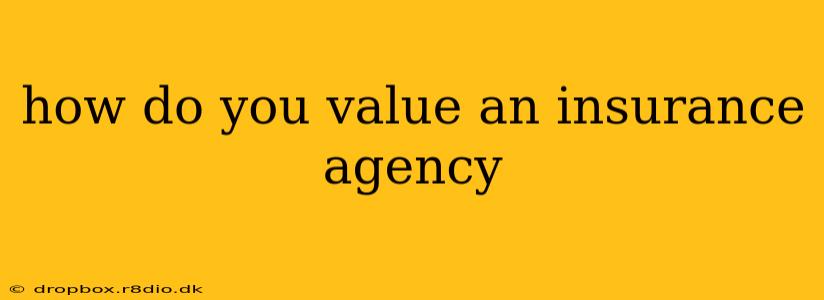How Do You Value an Insurance Agency? A Comprehensive Guide
Valuing an insurance agency is a complex process, requiring a nuanced understanding of the business's financial performance, market position, and future potential. Unlike valuing a simple asset, an insurance agency's worth is intrinsically linked to its intangible assets like client relationships, brand reputation, and the expertise of its staff. This guide will explore the key methods used to determine the fair market value of an insurance agency.
Key Factors Influencing Insurance Agency Valuation
Before delving into valuation methods, understanding the critical factors influencing an agency's value is paramount. These factors significantly impact the final valuation and should be meticulously analyzed:
-
Revenue and Profitability: A strong track record of consistent revenue growth and healthy profit margins is a significant driver of value. Analysts scrutinize financial statements, examining key metrics like net income, EBITDA (Earnings Before Interest, Taxes, Depreciation, and Amortization), and operating cash flow. Consistent year-over-year growth demonstrates stability and future earning potential.
-
Client Base: The quality and diversity of the client portfolio are crucial. A large client base with long-term contracts and a diversified mix of clients across industries significantly increases value. Client retention rates are also critical indicators of agency stability and success.
-
Agency Size and Scale: Larger agencies generally command higher valuations due to economies of scale and greater market share. The number of employees, the agency's geographic reach, and its overall market presence all influence valuation.
-
Management Team and Employees: The experience, expertise, and reputation of the management team and key employees are essential intangible assets. A strong team capable of sustaining growth and maintaining client relationships significantly enhances value.
-
Technology and Infrastructure: Modern insurance agencies rely heavily on technology. The agency's technological infrastructure, including its CRM (Customer Relationship Management) system, policy management software, and online presence, contributes significantly to its efficiency and overall value.
-
Market Conditions and Competition: The overall health of the insurance market and the level of competition in the agency's geographic area significantly impact its value. A favorable market with limited competition leads to higher valuations.
Common Valuation Methods for Insurance Agencies
Several methods are commonly used to value insurance agencies, each offering a slightly different perspective:
1. Discounted Cash Flow (DCF) Analysis: This method projects the agency's future cash flows and discounts them back to their present value using a discount rate that reflects the risk associated with the business. It's a robust method, but it requires detailed financial forecasting and assumptions about future growth.
2. Market Multiple Approach: This involves comparing the agency's key financial metrics (e.g., revenue, EBITDA) to those of comparable agencies that have recently been sold. The resulting multiples (e.g., revenue multiple, EBITDA multiple) are then applied to the agency's financial data to estimate its value. This method relies heavily on finding truly comparable agencies, which can be challenging.
3. Asset-Based Approach: This method focuses on the net asset value of the agency's tangible assets, such as office equipment and inventory. While less common for insurance agencies, it may play a supplementary role, particularly if the agency has significant physical assets.
4. Excess Earnings Method: This method separates the earnings attributable to tangible assets from the earnings attributable to intangible assets, such as goodwill and brand reputation. It then capitalizes the earnings attributable to intangible assets to estimate their value.
Choosing the Right Valuation Method
The most appropriate valuation method will depend on the specific circumstances of the insurance agency. Often, a combination of methods is used to arrive at a more comprehensive and reliable valuation. Engaging a qualified business valuation professional is highly recommended to ensure a fair and accurate assessment. They possess the expertise to navigate the complexities of insurance agency valuations and provide valuable insights into the factors influencing the agency's value.
This detailed guide provides a comprehensive understanding of the various factors and methods involved in valuing an insurance agency. However, remember that this is a complex process best handled by professionals. This information should not be considered professional financial advice.

